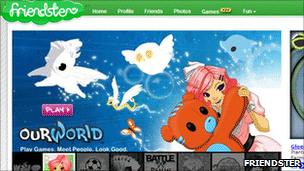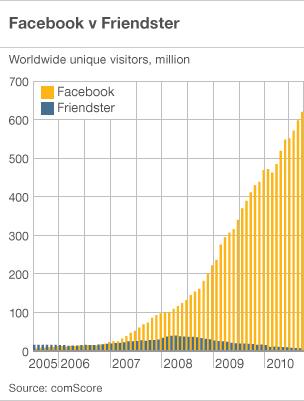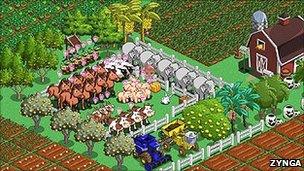Veteran social network Friendster hits comeback trail
- Published

Friendster owners hope a range of social games can keep grow its userbase in Asia
In the days when adding friends, poking and setting a relationship status were just a distant sparkle in Facebook founder Mark Zuckerberg's teenage eye, Friendster was already playing the social-networking game.
Founded in 2002 by Jonathan Abrams and Ross MacKinnon - two computer programmers working in Silicon Valley, California - Friendster burst onto the scene in March 2003.
It was, Mr Abrams was rumoured to have said, a great way to meet girls.
By the autumn of 2003 it had amassed three million users and secured millions of dollars worth of investment.
Mr Abrams was thrust onto the covers of top magazines and appeared on late-night US talk shows.
MySpace, Bebo and Facebook were still nowhere to be seen.
Friendster, with its rapidly growing userbase, had the biggest headstart in a race which would come to define the decade.
Bleak future
It is a race Friendster ended up losing. Eight years on from its Silicon Valley beginnings, the website barely resembles its original self.
A string of software glitches and slow performance plagued the site, and, as competitors loomed, the number of active users plummeted.

In the years that followed, many of the brains behind Friendster's early success moved on to other projects - perhaps ruing early missed chances to sell up to Google.
And as visitor numbers continue to dwindle, the future appears bleak for the godfather of huge social networks.
There may be a twist in the tale yet, though. In December 2009 Friendster was acquired by MOL Global, Asia's leading "online payment solutions provider".
While Friendster has all but disappeared from the radar in the US, its take-up in Asia is still strong, and MOL Global is intent on making that count.
The site says 90% of its entire traffic comes from from the continent, and Friendster is neck and neck with Facebook in countries like Malaysia and the Philippines.
Exciting model
But the company cannot rest on its laurels - it learned that lesson the hard way when, according to the New York Times, Friendster scoffed at early incarnations of MySpace and Bebo.
It is now hoping its latest product launch will be the start of a highly profitable resurgence.
Friendster Games will draw on the massive success of Farmville, a Facebook-based social game that allows players to build and maintain a farm.
Over 50 million people play Farmville every month - many spending real-world money in order to obtain "Farm cash" to spend on their farms.
It is a model which excites Ganesh Kumar Bangah, MOL Global's CEO.
"If you'd asked me three years ago whether Farmville, a game where you can go and basically build your farm by buying cows etc would be very popular, I would say you were crazy," he told BBC World Service's Jennifer Pak.
He estimates that the social gaming industry will be worth $5 billion by 2012, and Friendster wants a large piece of it.
"Just because Friendster started first and lost market share to a competitor, it doesn't mean it cannot re-engineer itself, or re-evolve itself, and be successful again," Mr Ganesh insists.
The site offers a suite of games that can be played - like Farmville - directly within the browser.
Titles include Blow 'Em up in Boomz (the site's most popular title, available in Chinese only) and Lady Popular, a game which invites players to "create your own Lady" and decide make-up, clothes and so on.
All the games have a distinctly Asian feel - with visuals inspired by Japanese anime and a nod to role-playing genres - and are engineered to encourage a local feel to the site's community.
'Content is king'
Alongside the gaming effort is a new music portal helping local independent acts promote and share their work. Somewhat ironically, it mimics the approach MySpace adopted as it toppled Friendster in the US.

Facebook-based Farmville has 50 million monthly players
Yet with more and more of its key userbase moving over to Facebook, all this may simply not be enough.
Indeed, just months after MOL Global acquired Friendster, it also went into partnership with Facebook to provide the software behind its Facebook Credits system.
Ashley Norris from social media agency Sutro Digital believes Facebook will never be beaten when it comes to social gaming, but suggests that Friendster's recent enhancements could help it retain existing, profitable, users.
"It goes back to content being the king, and content being the key," he said.
"If you can provide lots of local content, you give people a compelling reason to come back to your site. Gaming's one element of it - but it could be music, television, video."
Social media analyst Chris Leong says Friendster will have difficulty attracting new users as a huge number of Farmville's fans would not actively search for games to play.
"The reason why they actively play games is because of Facebook. Because some of their friends invited their friends on Facebook and they happen to hang around on Facebook for pictures and for other kinds of status updates - that's why they love the games that they play."
This chimes true for Sarah Skidmore, a 22-year-old self-confessed Farmville addict from the UK.
"I found it through friends on Facebook. I play it because it's free and it's the sort of game you need to keep coming back to.
"Facebook is a site I go on every day anyway - so it's just easier there."
- Published14 October 2010
- Published21 May 2010